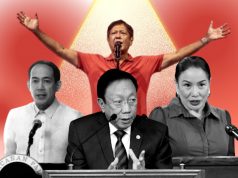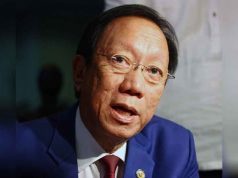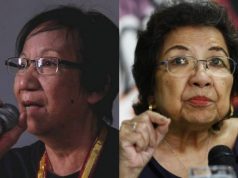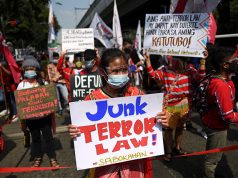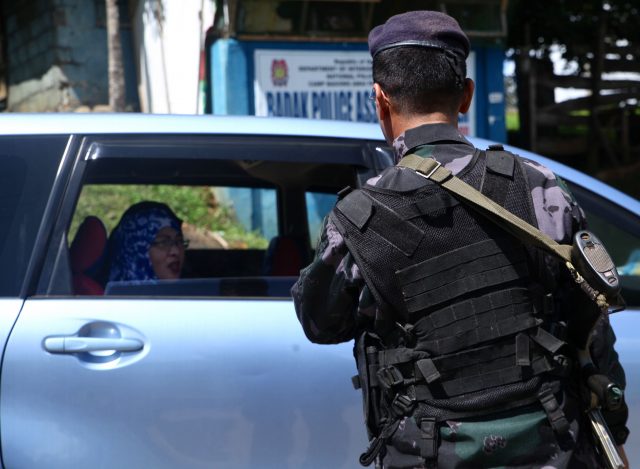
MANILA – Alleged abuses and human rights violations that were committed while Mindanao was under Martial Law during intense fighting between the Maute terrorist group and government forces cannot be a basis to invalidate the extension of Martial Law, Solicitor General Jose Calida asserted Wednesday.
During oral arguments on the petitions against such an extension – the second such extension, running from Jan. 1 to Dec. 31, 2018 – Calida added that these claims are also unsubstantiated, given that the Armed Forces of the Philippines’ office in charge of receiving complaints regarding human rights violations has not received any.
The alleged abuses and human rights violations are also irrelevant to the determination of the validity of the extension, he said. If there were human rights violations committed during Martial Law in Mindanao, the Supreme Court had already ruled in the case of Lagman vs. Medialdea that such violations must be addressed in a separate proceeding.
Human rights group Karapatan reported early this month that since the declaration of Martial Law on May 23, 2017 up to November 2017, as well as in the ongoing counter-insurgency war, it recorded at least 29 victims of extrajudicial killings in the Mindanao.
“Many of the victims were members of local peasant and indigenous organizations targeted for their local campaigns for genuine agrarian reform and against militarization,” it said.
Karapatan also documented 15 cases of torture, 23 victims of frustrated extrajudicial killings, 58 victims of illegal arrest and detention, and 335,686 victims of indiscriminate gunfire and aerial bombings.
PETITIONERS FROM METRO MANILA
Calida noted that the petitioners against the extension of Martial Law were mostly based in Metro Manila.
They include former Commission on Human Rights chairperson and Akbayan Partylist Representative Loretta Ann Rosales, Albay 1st District Representative Edcel Lagman, and 1986 Constitutional Commission member Atty. Christian Monsod. Calida added, “All the petitioners are haunted by the ghost of martial law past.”
Rosales has been candid about being sexually abused and tortured during the Marcos-era Martial Law, while Lagman’s brother, a human rights lawyer, was a victim of enforced disappearance.
“There is no reason for them to feel that way” about the martial law in Mindanao declared in 2017 by President Duterte, Calida said, as he noted that Martial Law does not suspend the operation of the Constitution. Nor does it supplant the operation of civil courts or legislative assemblies.
He added that the guarantees under the Bill of Rights remain, and pointed out that the suspension of the privilege of the writ of habeas corpus applies only to those judicially charged with rebellion or offenses connected with invasion.
“President Duterte has not violated these safeguards,” Calida said.
He also zeroed in on the 43 “acts of terrorism” committed by rebel groups this year alone, where they used improvised explosive devices and even kidnapped people, which resulted in the deaths of eight civilians, three of whom were “mercilessly beheaded”.
‘REBELLION, THREATS PERSIST’
The Solicitor General argued that even as the leadership of the Maute Group was “decimated” in Marawi City, the rebellion in Mindanao persists, as the surviving members of the militant group have not laid down their arms.
He added that the violence committed by the Bangsamoro Islamic Freedom Fighters, the Abu Sayyaf Group, and the Ansar al-Khilafah Philipines should be considered in determining whether the rebellion in Mindanao has been completely quelled. They are capable of perpetrating “strategic and well-coordinated mass-casualty attacks” to overthrow the government and establish a “wilayah” (province) in Mindanao, Calida said.
He said the New People’s Army was launching offensives in Mindanao while the National Democratic Front of the Philippines was engaged in peace talks with the government. He claimed that the NPA has forged a common front with the Muslim rebels to “remove the allegiance of Mindanao to the duly constituted government.”
“Public safety inevitably requires the extension of the proclamation of Martial Law, and the suspension of the privilege of the writ of habeas corpus in Mindanao,” Calida concluded. The dangers posed by these groups cannot be discounted, and the extension of Martial Law will address the rebellion they are waging in Mindanao.
“After the rebellion is quelled, Mindanao, the land of promise, will hopefully be transformed into a land of fulfillment,” Calida said. “I dream of a peaceful and progressive Mindanao. I beseech this honorable court to support the President’s vision and initiative as well as the approval of Congress of a one-year extension of Martial Law and the suspension of the writ of habeas corpus. There is nothing more awesome than the three great branches of government helping each other for our nation’s sake.”





